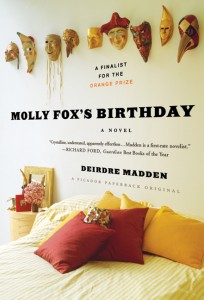Molly Fox’s Birthday by Deirdre Madden is a unique book. The entire plot technically takes place on one day (would you be surprised to hear that day is Molly Fox’s birthday?), but the narrator (not Molly Fox) pauses to reminisce throughout the day and we readers travel back with her, and along the way details of her past are colored in. The style felt very clean, and fresh. There’s a particular sort of mood that would be best paired with this book, though it’s hard to lay a finger on just what mood that would be. It almost felt meditative. It’s not a book packed with action or adventure, but the writing is beautiful, and the insight into the characters is skillful and interesting.
Rather than say more, how about some of my favorite passages?
~
Eventually we decided, after much discussion, that our different approaches to character could be seen as a continuum. For me, as a playwright, the creation of a character is like listening to something faint and distant. It’s like trying to remember someone one knew slightly, in passing, a very long time ago, but to remember them so that one knows them better than one knows oneself. It’s like trying to know a family member who died before one was born, from looking at photographs and objects belonging to them; also from hearing the things, often contradictory, that people say about them, the anecdotes told. From this, you try to work out how they might speak and how they might react to any given circumstance, how they would interact with other characters whom one has come to know by the same slow and delicate process. And out of all this comes a play, where, as in life, people don’t always say what they mean or mean what they say, where they act against their own best interests and sometimes fail to understand those around them.
pages 7-8
Because even then I understood that theatre, if it was any good at all, wasn’t something you saw, it was something that happened to you.
page 32
When I went back down to the kitchen I was struck by how it had changed since the morning, with the changing light of the day. I had seen this room – and this house – at all seasons, at all times of the day and night. I had been here when the whole place was cocooned with snow. I had seen it by candlelight. I had been here during heavy rain, the kind of rain that becomes pleasurable to watch because it makes of the house a haven. The rooms in which one moves become a world apart from the wet streets, the sodden garden.
page 159
The seating of the auditorium was arranged in curved rows, and from where I was placed I was able to observe not only the stage but also the audience. I could see all the people by the light of the stage, their rapt faces, the quality of the attention they were giving to what they were watching. Each of them was making their own private connection with the work, each bringing their own experiences and emotions to bear upon the play, to interpret it and integrate it into their own imaginative life. That this was happening in the presence of so many other people was crucial. In the apprehension of art there can be a loneliness, as there so often is in its creation. This breaching of loneliness may be the secret of what an audience is, or at least one of its secrets. That night when Molly appeared as the Duchess, I looked at the audience and I thought, nothing surpasses this.
page 213
Is the self really such a fluid thing, something we invent as we go along, almost as a social reflex? Perhaps it is instead the truest thing about us, and it is the revelation of it that is the problem; that so much social interchange is inherently false, and real communication can only be achieved in ways that seem strange and artificial.
page 214
